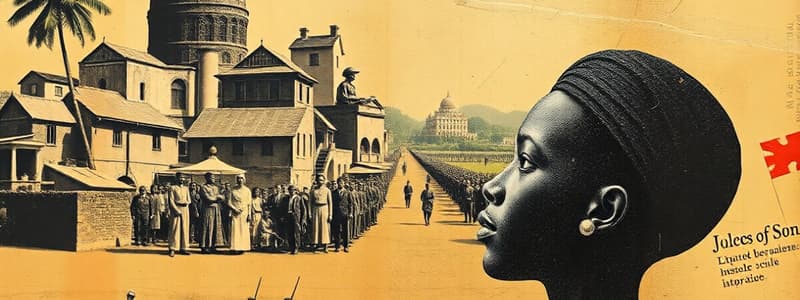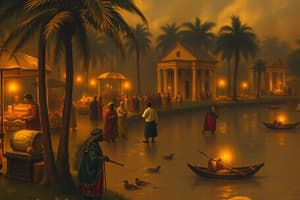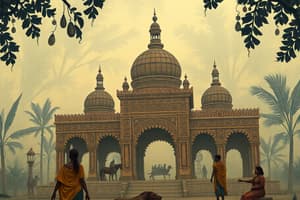Podcast
Questions and Answers
Ghana's early economic strength was significantly derived from which combination of factors?
Ghana's early economic strength was significantly derived from which combination of factors?
- Iron smelting for weapon production and control of the gold trade. (correct)
- Domestication of horses and establishment of sea routes for trade.
- Agricultural surplus from fertile lands and taxation of salt.
- Extensive copper mining and trade in textiles.
Koumbi Saleh's significance in the Ghana Empire was primarily due to its role as the:
Koumbi Saleh's significance in the Ghana Empire was primarily due to its role as the:
- Royal residence, economic hub, and center of trade. (correct)
- Religious center for indigenous beliefs and spiritual practices.
- Primary military stronghold and center for iron production.
- Agricultural heartland providing food surplus for the empire.
The trade system of Ghana involved exchanging imports like textiles and horses for exports, notably gold, and also relied heavily on:
The trade system of Ghana involved exchanging imports like textiles and horses for exports, notably gold, and also relied heavily on:
- Labor supplied by enslaved populations.
- Royal monopolies over essential commodities.
- Tribute collected from conquered territories.
- Taxes levied on trade activities. (correct)
Majan Dyabe Cisse, a significant ruler of Ghana, is best known for:
Majan Dyabe Cisse, a significant ruler of Ghana, is best known for:
Which factor is considered a significant contributor to the decline of the Ghana Empire?
Which factor is considered a significant contributor to the decline of the Ghana Empire?
Which factor most significantly contributed to the economic prosperity of Koumbi Saleh, the capital city of the Ghana Empire?
Which factor most significantly contributed to the economic prosperity of Koumbi Saleh, the capital city of the Ghana Empire?
What is the most reliable source of information about the Ghana Empire?
What is the most reliable source of information about the Ghana Empire?
What role did Islam play in the Ghana Empire?
What role did Islam play in the Ghana Empire?
Which of these statements accurately describes the relationship between the Ghana Empire and the modern-day country of Ghana?
Which of these statements accurately describes the relationship between the Ghana Empire and the modern-day country of Ghana?
What was one proposed reason behind the founding of the Ghana Empire?
What was one proposed reason behind the founding of the Ghana Empire?
Flashcards
Ghana Empire
Ghana Empire
An empire in West Africa, existing from 830 to 1235 C.E., known for its gold.
Location of Ghana Empire
Location of Ghana Empire
Western Sudan (West Africa).
Islam's Impact on Ghana
Islam's Impact on Ghana
A major religion that greatly influenced the culture and economy of the Ghana Empire.
Ghana Empire Capital
Ghana Empire Capital
Signup and view all the flashcards
Ghana Empire Founded
Ghana Empire Founded
Signup and view all the flashcards
Ghana's Gold Trade Role
Ghana's Gold Trade Role
Signup and view all the flashcards
Koumbi Saleh's Importance
Koumbi Saleh's Importance
Signup and view all the flashcards
Ghana's Key Trade Goods
Ghana's Key Trade Goods
Signup and view all the flashcards
Majan Dyabe Cisse
Majan Dyabe Cisse
Signup and view all the flashcards
Reasons for Ghana's Fall
Reasons for Ghana's Fall
Signup and view all the flashcards
Study Notes
- The Ghana Empire existed in West Africa from 830 C.E. to 1235 C.E.
- "Ghana" means "king of gold".
- Other names for the Ghana Empire are Wagadou and Awkar.
- The Kingdom of Ghana ruled over a large part of Western Sudan (West Africa).
- Most information about the Ghana Empire was passed on through oral tradition.
- Islam greatly influenced the culture and economy, especially in the last two centuries, with over ten mosques in the capital.
- Akan gold weights from Ghana are a manifestation of the immense amount of gold available in the empire
Location
- The Kingdom of Ghana is not the same as the country of Ghana today, as they do not geographically overlap.
- The Kingdom of Ghana was north of present-day Ghana, occupying the same area as modern Mauritania and Mali.
- The capital city of the Ghana Empire was Koumbi Saleh.
- Koumbi Saleh served as the center of trade and the wealthiest city in the empire.
Founding
- The Ghana Empire was founded in 850 C.E.
- It was founded by families and groups who wanted to develop and maintain control over all of Africa through economic trading power.
- One theory suggests the empire was created to capitalize on iron smelting techniques for weapons.
Wealth
- A main industry in Ghana was iron smelting for weapons production.
- Ghana was central to the gold trade.
- Some accounts reference massive gold mines within Ghana, though these might refer to the kings' treasuries.
- Koumbi Saleh was the trade center and richest city, where the kings resided.
- Merchants acted as traders and political/administrative advisors.
- Ghana imported copper, textiles, beads, and horses in exchange for exports and taxes.
- Rulers kept most of the wealth, taxing traders entering and leaving the empire.
- Poorer villages surrounded the main cities like Koumbi Saleh.
Trade
- The Ghana Empire was strongly involved in the Trans-Saharan Gold Trade.
- Main trade items included salt, gold, copper, iron, ivory, and other hard materials found within the empire.
- Traders from the Kingdom of Ghana were the first who widely use the camel in their business.
- Traders were highly respected due to trade's importance.
Leaders
- All kings lived in Koumbi Saleh and kept gold in personal treasuries.
- Key rulers of the Kingdom of Ghana include:
- Majan Dyabe Cisse (Dinga Cisse): The first warrior king, who united people through economic power in the late eighth and early ninth century C.E.
- Diara Kante: Took control in 1180, establishing the Diarisso Dynasty.
Fall
- The fall of the Ghana Empire occurred in the twelfth and early thirteenth centuries.
- Theories for the fall include:
- Wealth attracting attacks from other kingdoms like Mali seeking gold.
- A devastating drought draining agricultural resources.
- Civil wars fragmenting the empire, possibly due to religious divisions between Muslims and followers of indigenous religions.
- In 1235 C.E., Arabs from North Africa conquered the Kingdom of Ghana.
- The conquered Ghana Empire was absorbed into the Islamic Mali Empire, led by Abu Bakr.
Studying That Suits You
Use AI to generate personalized quizzes and flashcards to suit your learning preferences.
Description
Explore the Ghana Empire, which existed from 830 C.E. to 1235 C.E. in West Africa. Discover its influence on culture and economy, especially through Islam, and learn about its capital city, Koumbi Saleh, and its location in modern Mauritania and Mali.




